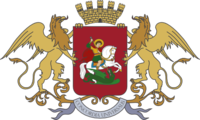Nation/Carchesia
| This page is a work in progress by its author(s) and should not be considered final. |
| Most Serene Carchesian Republic | ||||||
|---|---|---|---|---|---|---|
|
||||||
| Motto: "Concordia Universalis" (Latin: "Universal Harmony") |
||||||
| Anthem: Hinn da Vixoria (Carchesian: "Hymn of Victory") |
||||||
Location of Carchesia in Atlantian Oceania
|
||||||
| Region | Atlantian Oceania | |||||
| Capital | Christiania | |||||
| Largest city | Carthage | |||||
| Official languages | Carchesian | |||||
| Recognised regional languages | ||||||
| Demonym | Carchesian | |||||
| Government | Unitary parliamentary republic (de jure) Federal parliamentary elective monarchy (de facto) |
|||||
| - | Captain Regent | Anna-Sofïa Caixebrâncos | ||||
| - | President of the Generalitat | Marin Petri | ||||
| Legislature | Assemblies of the Republic | |||||
| - | Upper house | Senate of the Republic | ||||
| - | Lower house | Assembly of the People | ||||
| Currency | Peseta (SRP) |
|||||
| Time zone | CST (UTC±?) | |||||
| DST not observed | ||||||
| Date format | dd-mm-yyyy | |||||
| Drives on the | left | |||||
| Calling code | +13 | |||||
| Internet TLD | .sr | |||||
Carchesia (/kɑːrˈkiːʒə/; Carchesian: Carchexa, /karˈkeʃa/), officially the Most Serene Carchesian Republic (Carchesian: Sèreníssima Reppública Carchesiana, pronounced /saɾeˈnisima ɾeˈpyvliɡa karkeˈʃana/), is a sovereign state consisting of the ???.
Modern Carchesia operates as a consensual and consociational democracy with a de facto federal structure under the state of autonomies. The Carchesian economy is generally described as a social market, with an entrenched tradition of tripartism and a policy known as the merchant state.
Etymology
History
The ancient cities
Rise and fall of empire
Medieval states
Resurgence
Civil war and the Silent Revolution
Modern history
Geography
Climate
Administrative subdivisions
| Senate of the Republic | |
|---|---|
|
|
| Assembly of the People | |
|
|
Politics
Carchesia is organised as a democratic, parliamentary republic with universal suffrage. The state operates under an uncodified constitution spread across several Basic Laws and Statutes of Autonomy; the conventions of legislative supremacy form the de facto highest principles of Carchesian constitutional law, namely that the Assemblies of the Republic can make any law on any subject, no valid Act of the Generalitat can be questioned by the courts and no Assembly can pass a law that cannot be amended or repealed by future Assemblies.
The Captain Regent is the head of state and commander-in-chief of the Carchesian Republican Armed Forces and is elected to a single, non-renewable term of six years by the Grand and General Assembly, an electoral college consisting of all members of the Assemblies of the Republic plus an equal number of delegates nominated by the autonomous assemblies. The Captain Regent acts as a largely ceremonial head of state, with the President acting as head of government, leader of the Government of the Generalitat and chief executive of the state. While the choice of a President is legally the sole prerogative of the Captain Regent, the appointed President must be confirmed by and able to command the confidence of the Assembly of the People, forcing the Captain Regent to choose a President acceptable to the political alliance in control of the legislature.
The Assemblies of the Republic form the bicameral legislature of the Most Serene Republic. The Assemblies enjoy legislative supremacy and can pass any law they wishes by a concurrent majority. The Assemblies also have the power to supervise government activities through its committees, remove the Government from office and elect the Public Defender. The Assembly of the People is the lower and more powerful of the two chambers. The Assembly consists of 500 delegates directly-elected by party-list proportional representation to terms of up to four years and has the sole power to invest and dismiss the Government. The Assembly is the body from which most legislation originates and possesses the power of the purse and the right to declare war and peace on behalf of the Republic.
The Senate is the upper house of the Assemblies and a largely corporative body, representing the interests of various sectors of society, as well as high clergy, prominent political families and top members of the judiciary. The Senate has the power to delay legislation, but lacks veto power; decisions and amendments made by the Senate can be overturned by an absolute majority of the Assembly of the People. The Senate’s status as a non-partisan body and its insulation from public opinion gives it the power to act as a chamber of sober second thought and gives the body a more collegial atmosphere than its elected counterpart; as the Government does not need to rely on the support of the Senate to remain in office and cannot rely on its automatic support, the Government commonly faces more serious scrutiny in the upper house than the lower.
Law and judiciary
Autonomies
The autonomies are the first level administrative divisions of the state. Autonomies are integrated by contiguous amalgamations of departments, prefectures or metropolises with common historic, cultural and economies ties to each other.
Each autonomy is created by a Statute of Autonomy passed into law by the Assemblies of the Republic, establishing the name of the autonomy, delineating its territories and providing the basis for the governance of the autonomy. Each autonomy is organised as a parliamentary republic and possesses a unicameral legislature elected via universal suffrage and the party-list proportional representation system, as well as a government responsible to said legislature.
The autonomies have vastly different degrees of legislative and executive autonomy. All autonomies possess powers over education, industry, commerce, public utilities, transportation, water, land law, labour law, public health, unemployment benefits and cultural affairs, whether alone or in cooperation with the central government.
Foreign Relations
Military
Carchesia maintains a military force with 563,000 active and 581,000 reserve personnel, built around a defence policy of deterrence and non-interventionism. Divided into the Army, Armada, Air Force and Guard, the Carchesian Armed Forces are headed by the Captain Regent as commander-in-chief, the Secretary of Defence as representative of the Government of the Generalitat and the Defence Staff appointed by the President and Secretary. The armed forces operate under a policy of conscription, with all Carchesian males and females (including those with dual citizenship) over the age of 18 required to serve at least twelve months in the military. Deferment is available for those entering higher education until three months after graduation, while conscientious objectors are permitted to do eighteen months of alternative civilian service instead of serving in the military, such as in the police, fire department, education, public hospitals, homes for the elderly or international humanitarian service.
The Republican Armed Forces are empowered by the Law on the Defence of the Most Serene Republic and given the mission to "preserve the independence, sovereignty, peace and security of Carchesia", "protect the interests of Carchesia" and "overcome any organisations or regimes responsible for aggressive acts that imperil the peace and security of Carchesia." Carchesian maintains a strict policy of deliberate ambiguity on whether it possesses nuclear, chemical and biological weapons to aid in its deterrence strategy.
Economy
Demographics
Language
Religion
Culture
Literature
Media
Sports
Food
Holidays
| |||||||||||||||||||||||||||||||||||||||||||||||||||||||





